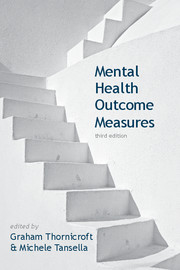Book contents
- Frontmatter
- Contents
- List of tables, boxes and figures
- List of contributors
- Foreword
- Foreword
- Preface: an evolving perspective of mental health outcome measures
- Part I Methodological issues
- 1 Measures of outcomes that are valued by service users
- 2 Statistical methods for measuring outcomes
- 3 Assessment instruments in mental health: description and metric properties
- 4 Using outcomes in routine clinical practice to support recovery
- Part II Domains of outcome measurement
- Part III Symptom severity outcome measures
- Part IV International approaches to outcome assessment
- Index
3 - Assessment instruments in mental health: description and metric properties
from Part I - Methodological issues
Published online by Cambridge University Press: 02 January 2018
- Frontmatter
- Contents
- List of tables, boxes and figures
- List of contributors
- Foreword
- Foreword
- Preface: an evolving perspective of mental health outcome measures
- Part I Methodological issues
- 1 Measures of outcomes that are valued by service users
- 2 Statistical methods for measuring outcomes
- 3 Assessment instruments in mental health: description and metric properties
- 4 Using outcomes in routine clinical practice to support recovery
- Part II Domains of outcome measurement
- Part III Symptom severity outcome measures
- Part IV International approaches to outcome assessment
- Index
Summary
Evaluation and assessment are essential components of healthcare and they require assessment instruments with known metric properties. However, health metrics has been developed in a scattered way and the related knowledge is still fragmented, with uneven development in different areas. Whereas in areas concerned with tangible phenomena such as temperature or medical imaging the focus has been on the reliability of technical instruments and interviewers, the evaluation of intangible phenomena (pain, dizziness, anxiety, disability, quality of life, well-being) has raised a whole array of complex questions with regard to feasibility, consistency, validity and cultural transferability, among others. Furthermore, the solutions suggested, for example by mental health experts, has differed from those in the field of quality of life, and even within mental health and ‘psychometrics’ a significant variability appears across different approaches.
Nonetheless, considerable effort at harmonisation has been made and contributions from fields such as education and psychology have been significant, particularly in item analysis and the development of rating scales. This trend is shown by the number of manuals and books in the field published during the last decade or so, as well as by the increasing knowledge base. For example, McDonald (1999) reviews the main quantitative concepts, methods and computational techniques needed for the development, evaluation and application of tests in the behavioural sciences; Tinsley & Brown (2000) provide a detailed description of the multivariate approaches to the development of rating scales; and Farmer et al (2002) give a comprehensive review of the theory and methods related to measurement in psychopathology. Other manuals offer an analysis of outcome assessment in mental health, including the measurable domains (i.e. symptoms, functioning, quality of life, and perception of care), the standards and instruments used, quality measures (i.e. validity, reliability, feasibility, usability and comparability) and links between care provision and outcomes (Ishak et al, 2002; Furr & Bacharach, 2008). Last, but not least, guides describing the main scales and their metric properties provide useful tools for both clinicians and researchers (Badía, 2007; Rush et al, 2008).
In this chapter we review the basic concepts, describe the types of assessment instruments and present the main metrics and quality parameters used in the mental health field. The main assessment instruments drawn upon to illustrate the discussion are listed in Table 3.1.
- Type
- Chapter
- Information
- Mental Health Outcome Measures , pp. 28 - 62Publisher: Royal College of PsychiatristsPrint publication year: 2010



